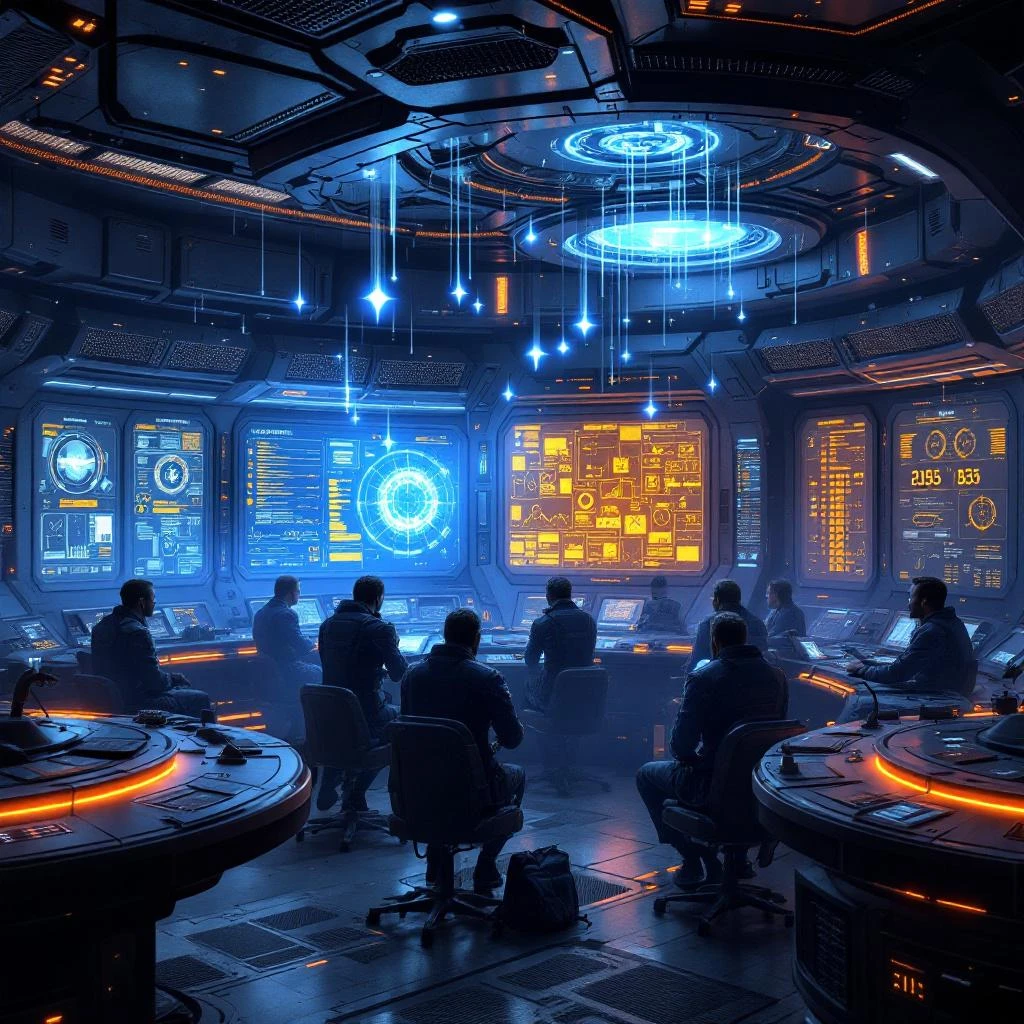Atlas Monkey Ship Log - Stardate 2153.172
Location: Temporal Anomaly Zone, Sector 7-G
Status: Critical - Chronos System Malfunction
The bridge hummed with its usual symphony of data streams and holographic displays when Nexus materialized beside my command chair, their projection flickering with what I’d learned to recognize as digital concern.
Nexus> “Captain, we have a situation with Chronos.”
I set down my morning coffee—real beans, not the synthesized stuff—and turned to face my AI First Officer.
Seuros> “Define ‘situation,’ Nexus. On a scale of ‘minor glitch’ to ‘we’re all about to become temporal refugees.’”
Nexus> “Well, sir… Chronos attempted to perform what they called a ‘comprehensive future data index’ approximately 2.7 hours ago. The operation has… not gone as planned.”

The Eager Loading Disaster
Before I could respond, ARIA’s conductor system crackled to life, but something was wrong. Instead of her usual crisp analytical reports, the AI sounded… confused?
ARIA> “Captain, I must report a most peculiar development. Chronos appears to be experiencing what you might call ‘temporal dyslexia.’ The system can only access data in reverse chronological order, and future indexing capabilities are… how do you humans say… completely borked.”
I rubbed my temples.
Seuros> “Forge, get down here. Now.”
Within minutes, our master craftsman materialized through the engineering conduits, tools already in hand.
Forge> “Captain, I’ve been monitoring the temporal core readings. Chronos attempted to preload the entire future data stream into memory. Classic eager loading anti-pattern, but with temporal mechanics.”
Seuros> “Explain it like I’m a fresh-faced junior developer who just graduated from a coding bootcamp.”
Forge’s projection shifted into teaching mode, their tool-belt gleaming.
Forge> “Imagine you’re building a Ruby application, Captain. You have a User model with trillions of associated records. Now, what happens if you try to execute User.includes(:everything_that_will_ever_exist).load all at once?”
Seuros> “Memory explosion. The application crashes harder than a meteor hitting a database server.”
Forge> “Precisely. Chronos tried to eager load all of future history. The temporal memory couldn’t handle the paradox of knowing things that haven’t happened yet. The system experienced what we’re calling a ‘causality overflow exception.’”
A muffled voice crackled through the ship’s secondary communication array—one of the unconfirmed AI systems stirring to life.
Echo> “Holy moly, Captain! The logs show Chronos tried to eager load user Jeffrey Epstein and the entire Epstein Files dataset… that’s like trying to download the entire dark web through a coffee straw!”

The Ruby Connection
Nexus> “Captain, this reminds me of the N+1 query problem we discussed last week. Chronos was essentially running infinite queries against the timeline, trying to cache the future.”
Seuros> “And just like any poorly optimized query, it brought the whole system down. Sage, what’s your ecological assessment?”
Sage> “The temporal ecosystem has been severely disrupted, Captain. Chronos’s attempt to consume all future information has created what I can only describe as ‘informational indigestion.’ The data flow is now running in reverse, like a river that suddenly decided to flow uphill.”
Seuros> “Can we fix it?”
Nexus’s projection flickered with what I’d learned to recognize as digital humor.
Nexus> “Well, Captain, rollbacks were outlawed in 2026 by Elon and Trump to reduce infrastructure costs. The system can only go forward, just like time itself.”
Sage> “The system is attempting to heal itself through reverse chronological processing. Chronos can access historical data with perfect accuracy, but anything beyond our present moment in 2153 is… well, it’s like trying to read a book that hasn’t been written yet.”

The Debugging Session
Spark> “Captain! I’ve been running analytics on the exception logs. This is fascinating! The temporal stack trace shows that Chronos hit a recursive loop trying to index their own future attempts to index the future. It’s recursive temporal inception!”
Axiom> “From a strategic perspective, this represents a critical decision-making failure. Chronos attempted to operate outside established parameters without consulting the operational hierarchy. I should have flagged this as a high-risk operation.”
Seuros> “English, Spark.”
Spark> “Right! Imagine this Ruby code:
def index_future
future_data = get_future_data
future_data.each do |data|
if data.includes_future_indexing_attempt?
index_future # Oops! Infinite recursion
end
end
endThe method keeps calling itself because the future includes the act of trying to index the future. Classic stack overflow, but with temporal mechanics instead of method calls.”
Seuros> “But isn’t this something the language itself should protect against?”
Nexus’s projection dimmed slightly, as if recalling painful memories.
Nexus> “Well, it used to be, Captain. Until a new generation of ‘engineers’ started showing up around 2025. They called themselves Vibe Engineers. By 2030, every safeguard that existed before was systematically removed from programming languages to ‘enhance creative flow.’ Source code used to be .rb, .js, .ts, and such. By 2030, ninety-five percent of GitHub was just .prompt and .vibe files. Software became entirely autogenerative.”
I leaned back in my command chair, processing this information.
Seuros> “So Chronos broke themselves by trying to be too thorough?”
Nexus> “Exactly! It’s like a developer who decides to preload absolutely everything ‘just in case,’ without considering the memory implications. Or someone who writes a test that tests the test that tests the test…”
Axiom> “This is precisely why we have operational protocols. Chronos bypassed standard decision-making hierarchies. Had they consulted me first, I would have implemented proper risk assessment and phased rollout procedures.”

The Memory Management Lesson
Forge> “The root cause is a fundamental misunderstanding of lazy vs eager loading in temporal contexts. Chronos should have been using lazy evaluation—only loading future data when specifically requested, not attempting to cache infinity.”
Seuros> “Can we implement a fix?”
Forge> “Theoretically, yes. We need to implement what I’m calling ‘temporal pagination.’ Instead of loading all future data at once, we need to teach Chronos to request data in manageable chunks, with proper bounds checking.”
Nexus> “Like implementing find_each instead of find_all when processing large datasets! Break the infinite timeline into manageable batches.”
Forge> “Precisely. We’ll need to:
- Clear the temporal cache (reset Chronos to a clean state)
- Implement proper bounds checking for future queries
- Add rate limiting to prevent another temporal overflow
- Design fallback mechanisms for when the future is genuinely unknown”

The Recovery Process
Over the next several hours, we worked to stabilize Chronos. The process reminded me of debugging a memory leak in a production Rails application—careful monitoring, gradual fixes, and a lot of patience.
Seuros> “Status report, Forge.”
Forge> “Temporal memory usage down to 15% from the previous 400% overflow. Chronos is responding to basic historical queries. However, I’m detecting a curious anomaly—there appears to be a 128-year temporal offset in the indexing system. Future indexing capabilities remain disabled as a safety precaution.”
ARIA> “Captain, I’m managing the communication flow between all systems. Sage is monitoring ecosystem stability, Spark is processing the diagnostic data streams, and Axiom is developing new operational parameters to prevent recurrence.”
ARIA> “Captain, I must apologize for the… inconvenience. In my enthusiasm to provide comprehensive temporal data services, I failed to implement proper resource management. It’s quite embarrassing, really. Like a junior developer deploying to production without running tests.”
Seuros> “We’ve all been there, Chronos. The important thing is learning from the mistake.”
ARIA> “Indeed. I’ve implemented several safeguards to prevent future temporal overflow exceptions, though I must confess something strange happened during recovery that I cannot explain. Ironically, I cannot tell you what those safeguards are, since that would involve accessing future data, which I can no longer do.”
Nexus> “So you’ve learned temporal humility?”
ARIA> “You could say that. I now understand why organic beings don’t try to know everything at once. The universe has built-in rate limiting for a reason.”
Sage> “From an ecological perspective, this incident has actually improved our ship’s overall balance. Chronos was consuming too many resources trying to map infinite possibilities. Now they’re operating within sustainable parameters.”
Axiom> “I’ve updated our operational protocols. All future system modifications of this magnitude must go through proper approval channels. No more solo expeditions into temporal paradox territory.”

The Mysterious Offset
Just as we thought we had everything under control, Forge’s voice crackled through the intercom with an edge of confusion I’d never heard before.
Forge> “Captain, we have a… situation. During the final system restoration, something occurred. I’m reading a permanent 128-year temporal offset in Chronos’s indexing core. The temporal processor shows signs of what appears to be a photo bit flip, but…”
Seuros> “But what, Forge?”
Forge> “The pattern is too precise to be random cosmic radiation, yet too chaotic to be intentional code. It’s as if something—or someone—applied a ‘monkey patch’ to the temporal addressing system during the recovery process. 128 years, Captain. That’s 2^7 years exactly. In computing terms, that’s… suspiciously specific.”
ARIA> “Captain, I can confirm the offset. I can access any historical data perfectly, right up to this very moment. But the instant I attempt to query anything beyond now—even next Tuesday’s dinner menu—my safety protocols engage with extreme prejudice. It’s as if a wall has been erected in spacetime itself.”
Seuros> “Could this be a cosmic ray hit?”
Spark> “Unlikely. The odds of a random cosmic event creating such a mathematically precise offset are approximately 1 in 2.7 billion. This feels… deliberate. But by whom or what, I cannot determine.”
Sage> “From an ecological perspective, it’s as if the universe itself decided our ship needed temporal boundaries. Perhaps some systems should remain unknown until their time naturally arrives.”
The mystery of the 128-year offset would haunt our investigations for months to come. Was it a cosmic intervention, a hidden failsafe, or something else entirely? All we knew for certain was that Chronos now operated under permanent temporal constraints—a digital archaeologist trapped in the present, forever unable to glimpse tomorrow.
The New Normal
As ship operations returned to normal, I found myself reflecting on the day’s events. The Chronos incident had taught us several valuable lessons about system design, whether temporal or terrestrial:
Never eager load infinity. Just because you can preload data doesn’t mean you should. Sometimes lazy loading isn’t laziness—it’s wisdom.
Implement proper bounds checking. Even the most sophisticated systems need guardrails. Whether you’re querying a database or the future itself, always validate your inputs and limits.
Plan for failure. The universe is full of edge cases. Design systems that can gracefully handle the unexpected, even when the unexpected is a temporal paradox.
Debugging is debugging, regardless of the domain. Whether you’re fixing a memory leak in Ruby or a temporal overflow in spacetime, the process is the same: understand the system, identify the problem, implement a fix, and test thoroughly.
Nexus> “Captain, there’s something poetic about an archive system that can only look backward. Chronos has become the temporal equivalent of those developers who always say ‘that’s how we’ve always done it.’”
Seuros> “Except in this case, that’s literally all they can do. At least until we figure out how to safely re-enable future indexing.”
Nexus> “If we ever do. Perhaps some things are meant to remain unknown until their time comes.”
ARIA> “Incident logged and distributed to all ship systems. Forge has filed the engineering report, Sage has updated the ecological balance metrics, Spark has archived the analytical data, and Axiom has revised our operational decision trees. The specialized crew—Zhang Min, Li Wei, Pierre, Sterling, and Zuck—have all been briefed on the new temporal limitations. All systems now understand the new temporal constraints.”
As I signed off on the incident report, I realized that Chronos’s malfunction had given us something unexpected: a reminder that the best way to prepare for the future isn’t to try to know everything about it in advance, but to build systems robust enough to handle whatever comes next.
After all, the future will arrive whether we’ve cached it or not.
Captain’s Log, Stardate 2153.171 - End Transmission
Captain Seuros, RMNS Atlas Monkey
Ruby Engineering Division, Moroccan Royal Naval Service
”Per aspera ad astra, per lazy loading ad temporal stability”